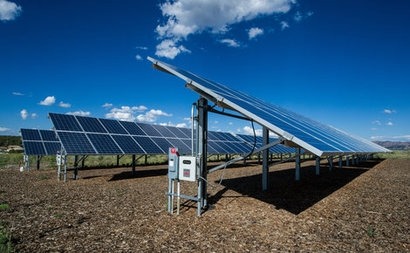
In a letter sent last week (Thursday 4th May) to the Secretary of State for Energy Security and Net Zero, Grant Shapps, committee chair Philip Dunne MP warns that if action is not taken “with some urgency, there is likely to be a very considerable shortfall,” on the Government’s target of 70 gigawatts of solar capacity by 2035.
“There is potential for solar energy to have a bright future in the UK, but a dark cloud of delays for the industry hinders the ability to meet its full potential” added Mr Dunne.
Resolving them “will enhance the UK’s energy security, help enable households and businesses to slash their energy bills and make a significant contribution to decarbonising the UK’s electricity supply” he wrote.
Waiting times for large solar projects’ connection to the electricity grid, both on roofs and ground, can often stretch well into the 2030s. Echoing the trade association’s views, the committee attributes this to historical underinvestment, the way connection applications are managed, “unresponsive” distribution network operators and “a regulatory failure with Ofgem failing to prioritise net zero.”
A further issue identified in the letter is that existing rules require that the capacities of collocated battery storage and solar site are put together when considering the grid infrastructure needed for them. But this is in fact excessive, considering that current will flow from them at different times of the day.
The MPs seek urgent short-term solutions to these problems , especially considering that solar “is the cheapest form of power”. Their demands include a new mission statement for Ofgem requiring grid operators to speed up investment.
In response, the committee will examine grid connection delays in more detail through a dedicated inquiry on enabling sustainable electrification of the UK economy. This will be accepting evidence until 1 June.
“We are very glad that the Environmental Audit Committee has taken our concerns on board, and I thank the MPs for opening their new inquiry. It is grossly unacceptable that solar projects with planning consent and with finance ready to go can told to wait more than a decade simply to connect to the grid. The situation is causing billions of pounds of economic damage to the UK,” said Solar Energy UK Chief Executive Chris Hewett.
The chair’s letter follows from evidence submitted to the committee’s inquiry into solar power, to which Solar Energy UK gave evidence in writing and in person.
A further way to significantly increase installation rates – vital to meet the 70 GW target – is through the Future Homes Standard, which will apply from 2025. According to the committee, future technical standards must specify solar photovoltaic and heat pump systems “as a minimum requirement” for new homes.
For retrofits, it draws attention to the need for low-cost finance to cover the capital cost of rooftop installations, particularly for households. The letter also recommends removing VAT from adding battery storage systems to existing solar power installations. Doing so is the current subject of consultation by the Treasury.
Finally, the committee welcomes the announcement of a joint industry-government taskforce on solar energy, revealed in March’s Energy Security Plan. Among its responsibilities will be resolving skills and supply chain issues, which “further reinforce the case for the Government to encourage solar manufacturing in the UK,” the letter states.
For additional information:

